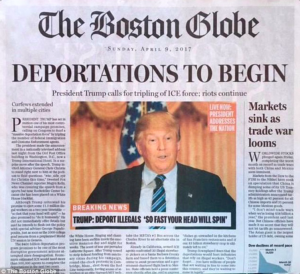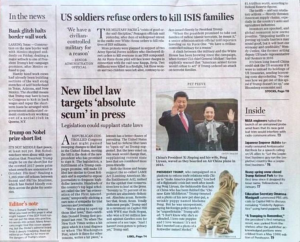The star of the second presidential debate was neither former Secretary of State Hillary Clinton nor Donald Trump. It was moderator Anderson Cooper, who addressed Donald Trump with the following question:
Throughout the two days since the release of the videotaped 2005 recording featuring the voice of Donald Trump bragging to Access Hollywood host Billy Bush about sexually harassing a married woman, kissing women he’s just met without permission, even groping women’s genitalia without warning, politicians and commentators have repeatedly described Trump’s recorded bragging about his repulsive and predatory behavior as “lewd talk.” The truth is that the actions he bragged about are not only distasteful and vulgar, they are also criminal. Kissing, fondling and groping people against their will are offenses that can result in arrest, sometimes imprisonment, and in some cases a lifetime spent on the sex offender registry. Donald Trump’s self-described behaviors were not just sexist and misogynistic; he bragged about engaging in criminal sexual predation and assault.
According to Newsweek, at least two women have publicly stated that Trump approached them in exactly the obscene manner he describes on the tape. One sued him for just such behavior: “Jill Harth, a pageant owner trying to work with Trump in the mid-1990s, filed suit against him in federal court in Manhattan in 1997, describing a ‘relentless’ campaign of sexual harassment and assault including an incident in which he reached under a table, put his hands on her thighs and grabbed her ‘intimate private parts’ during a meeting at a New York restaurant.”
Although Trump disavowed his words during the televised town hall debate and says he did not actually do the things he boasted about with Billy Bush in 2005, the Associated Press says that numerous people who worked for Trump on The Apprentice say they often witnessed Trump behave in lewd, misogynist and inappropriate ways. In May 2016, The New York Times reported on Trump’s long history of inappropriate and disturbing behavior with women. In the aftermath of the Access Hollywood tape’s publication, CNN shared snippets of some of the many lewd discussions Trump had about women with Howard Stern on the latter’s radio show.
During a legal deposition in the 1990s, Trump’s first wife, Ivana, told her friends that he had “raped” her toward the end of the marriage, and she testified during her divorce proceedings that he had sexually assaulted her while they were married. Under oath she described how Trump had held her arms back, ripped chunks of hair out of her scalp and raped her in a fit of rage.
Have we heard the last of Trump’s history of sexual harassment and even sexual assault of women? Surely not. It has taken great courage for women to stand up to Trump in the face of his ruthless counter-attacks and character assassination, but one hopes it will be easier for his victims to feel safe speaking publicly about their experiences thanks to reporters like the Washington Post’s David Fahrenthold and CNN’s Anderson Cooper who take these reports seriously and describe Trump’s behaviors as the criminal offenses that they are.
Kudos to Anderson Cooper for his excellent work at the debate working alongside formidable and talented co-moderator Martha Raddatz of ABC News, and many thanks to Cooper for reminding the candidate and the nation that bragging about assault is not mere “lewd talk” or “locker room boasting.” Assault is assault. Period.


